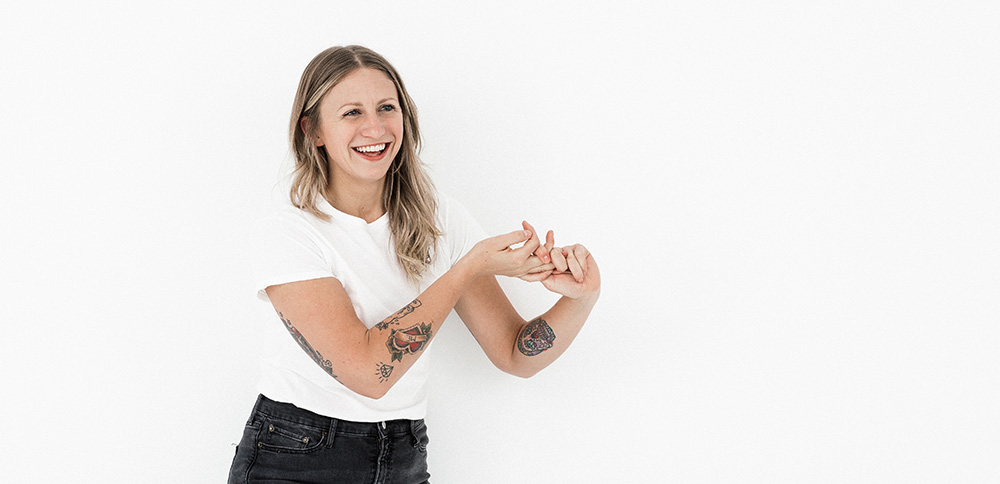Starting a small business wasn’t always one of my goals. Growing up in a family of 9-5ers I was pretty comfortable with full-time employment and a bi-weekly paycheck…until I wasn’t.
Since taking the leap (read: belly flop) in 2013, I’ve seen a huge upswing in people choosing to dive into the ocean of #freelancelife. To help ease that transition to self-employment, I’m sharing the most impactful lessons I’ve learned along my entrepreneurial journey – and holy heck do I wish I had these insights in my back pocket before I got rolling.
The top 5 things I wish I knew before starting a small business:
1. Time is money
Time gives all kinds of returns on investment: emotional, energetic, and of course, cash-money. Setting boundaries to protect that return on investment matters.
Create structure in your days: give your daily calendar a workout and schedule e-v-e-r-y-t-h-i-n-g. Start with your personal life (workouts, time with your people, downtime), then prioritize and block in the work that moves your business forward.
Keep your calls contained to a 2-3 hour block instead of taking them at all hours. If you’re commuting for a meeting, see who else – professionally or personally – you can meet before or after that engagement to optimize time away from your meaningful work hours.
By learning how to structure my time strategically, my ‘financial earning’ hours are more productive and I’m able to plan more downtime to fill my ‘energy bank account’.

Photo: Jeremy Jude Lee
2. Know thy deliverable capacity
Self employment = no manager telling you what to do next. This means figuring out how to manage your workflow.
You need to discover:
- how long projects actually take.
- how long you can focus on one task before you need to know what’s in the fridge (again).
- how many hours in a day you can actually be productive.
- what number of active clients works best for you.
This is an experiment to start, and will evolve as you get more proficient and efficient. But this insight, coupled with consciously committing to client requests (i.e., replacing a fast “yes!” with saying “let me check my schedule and get back to you by ________”), will help you avoid panic and support in keeping your word – and your sanity.
Toeing the line between what’s workable and what’s overload is a key step in finding your deliverables sweet spot.
3. Variable income = variable savings
Embrace variability in your earnings by saving a percentage of each cheque instead of a fixed amount each month.
I tried depositing a fixed amount into my savings account monthly, but found the inconsistency in income challenging to plan for. Using a percentage approach makes saving more accessible because I’m never financially crippled by my savings plan. It also makes makes my ‘number happy’ brain rejoice as I calculate and carve that percentage out of my chequing account and transfer it to my savings. While every month looks different, I’m making consistent progress towards my financial goals (and taking advantage of compound growth).

Photo: Albert Law
4. Stand strong in your services
It took me a year to feel confident telling people I was a copywriter. In that year, I said yes to nearly every project that hit my inbox. While the tactic worked in paying my bills and clarifying where I add value to clients, I was often distracted from my goals as a writer.
Scarcity mindset is real, and will trick you into thinking you may never get another contract. Combat that mindset by generating the confidence to say no to opportunities that aren’t the work you’re aiming to grow your expertise in. The inverse of scarcity is abundance; focusing on and offering up your expertise will attract opportunities aligned with your goal
*Disclaimer: be responsible! I’m a huge proponent for complementing your freelance practice with a part-time, low commitment job (serving will do nicely!) if you’re cash-strapped. Putting financial strain on your burgeoning business or creative pursuit can be a challenging transition – there’s zero shame in the taking-care-of-your-finances game while things ramp up.
5. Staying healthy is strategic
As self-employed humans, if we don’t have our health – physical, mental, emotional – we don’t have a business. I thank my lucky chickens that I’ve been healthy, but the few times I’ve needed prescriptions for some pesky sinus infections, my bank account took a hit.
Find a benefits program that makes the transition from a corporate/parental/post-secondary plan an easy one; seek programs that offer extended health, dental and vision, and include spending for alternative practitioners like massage therapists, naturopaths, acupuncturists and physiotherapists. Vancity members: take a peek at the Vancity Member Health Benefits Plan and see if it’s a fit for you!
Related posts
- 5 tips to make it as a freelancer
- Turning my side hustle into a sustainable future
- How I make money as a full-time artist
This blog post was updated on October 14 2020








